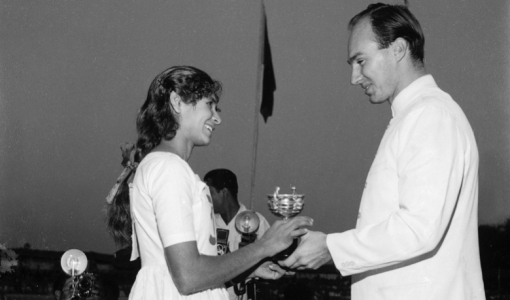THE UNIQUE TECHNICAL REVOLUTION - Speech to the Chamber of Commerce and Industry - 1964-12-21
This speech was delivered at the Chamber of Commerce and Industry, Hyderabad by H.R.H. The Agakhan in December, 1964.
I am grateful and honoured by your kind invitation to me to-night, and I am sincerely thankful to you for having given me this occasion to meet the industrial and business elite of this historical and beautiful city.
As my tour in Pakistan nears its end, more and more people say to me: 'you have been over-worked, you must be very tired, how do you hold up to the strain,' and many other such kind questions. Indeed a tour of a month and a half is a mental and physical strain, but probably the most consistent battle that I have had to wage in the last month and a half, has been my personal war against over-feeding. For the past two weeks, every tea, luncheon and dinner has been a public event and were I to stay here any longer, I have little doubt that if you were to call on me to address you again, my tailor would be sitting in the front-row.
Mr. President, you have said very kind words about my Grandfather, my Father and myself, and I am all the more honoured by your comments as you are and have every right to be severe judge. To-day I believe that Pakistan and many other parts of the world are waking up to the new skies of the future. In appointing me to succeed him to the Imamate, my Grandfather mentioned the unique technical revolution which he forecast would bring extraordinary changes in the lives of all human beings. To-night I believe that we are like poor men waking up in the early morning, seeing the first rays of sun-light in the sky without seeing the sun itself, and wondering whether, when the sun actually rises, it will bring with it a fine warm day to ripen our crops or a thunder-storm which will destroy the months of hard labour that we have put into preparing the bumper season. Most of us know that there is a fantastic amount of scientific and technical material hidden away in the coffers of the developed countries, but still for many reasons this new marvellous knowledge has not affected our everyday lives. Indeed in the early morning we know that the sun is there but it is very rare to know how it will affect the day when it rises to its zenith.
It is my sincere hope and prayer that the Chamber of Commerce and Industry of Hyderabad and all other leading figures in Pakistan, will turn our early morning expectancy into mid-day material well-being, and I am indeed convinced that the development gap between the rich and the poorer countries can be put to good use by the latter if they will make use of every iota of new technical and scientific information which comes to us in the years ahead and which can be adapted to the national life of Pakistan.
The new industrial and commercial processes which to-day are being effected practically at every hour by new technical and scientific knowledge are for many reasons being restrained in their development because the societies in which the processes have been born are too firmly bound by labour regulations, by extravagant development cost, or by the difficulty of getting established institutions to adopt the new processes. It is my belief that this situation can be put to good use by Pakistan if a continuous and determined effort is made in every new project on Pakistan's soil to bring in the very newest, even experimental processes, of industrial, commercial and agricultural production. I am convinced that in two or three generations' time, Pakistan will be among the world leaders in efficient modern production methods. A concept such as the one I have mentioned is not free of pit-falls. In the first place, no businessman or industrialist will be prepared to use production process which are so experimental as to be inefficient, and judge when a process has passed from the experimental to the feasible stage, is extremely difficult. At the same time many problems arise concerning the training of labour on ultra-modern machinery; on the other hand if a process is just coming out of its experimental stage the firms supplying the equipment are usually quite happy to give their new inventions the maximum support and in many cases semi-research equipment is sold on particularly attractive commercial terms. Added to this, it has been the experience of members of my own community and also my own that one can have extremely agreeable surprises with the training of labour on new machinery. In at least two cases in which I am directly interested, the machinery manufacturers have been so astonished by the results of their own machinery that they have posted observers for two years in the factory to tabulate and then interpret the results achieved.
The first case concerned the use of photo-electric printing and off-set rotary machines for use in daily newspaper production. The second, which is even more recent, concerns the use of electronically controlled equipment in the manufacture of carpet-backing.
I hope therefore that the members of the Chamber of Commerce and Industry of Hyderabad, when they visit newly established factories in developed countries, will make it a point of noting what are the most modern technical developments in each particular field, and that they will on their return to Pakistan discuss them with all your members so that in the near future most of Pakistan's new industries, new commerce and agricultural undertakings, will have avoided the small step into the end of the twentieth-century and will have taken the bold and courageous step into the twenty-first century.
- 5619 reads
 Ismaili.NET - Heritage F.I.E.L.D.
Ismaili.NET - Heritage F.I.E.L.D.